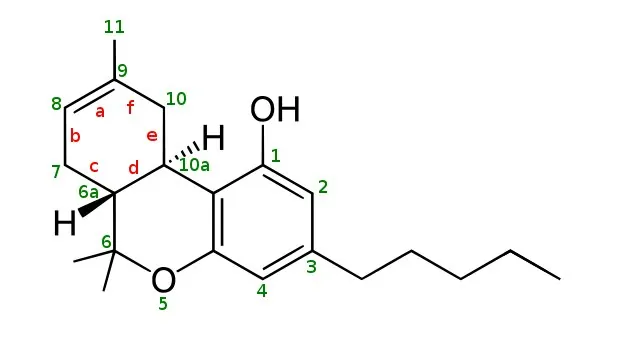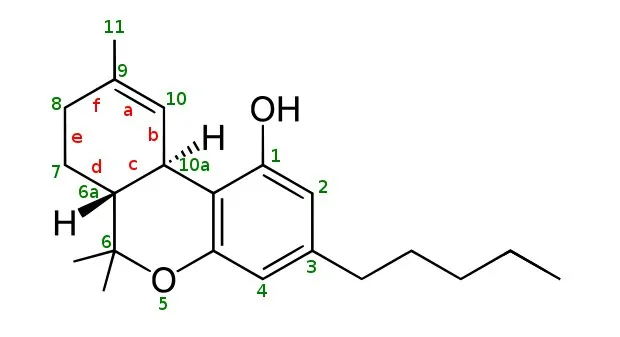No products in the cart.
What Is Delta-8 THC? [A 2024 Guide]

Key Takeaways
- Delta-8 is a form of psychoactive THC created by washing CBD isolate in acid.
- Delta-8 THC’s legality varies from state to state. Be sure to check your state’s laws before you decide to purchase any products.
- Delta-8 will make you feel intoxicated and will make you fail a drug test, just like other types of THC.
Table of Contents
A few years since its introduction to the market, delta-8 THC continues to make waves in the cannabis industry. As a more mild substitute to delta-9 THC, delta-8 still gets users high. But what is Delta-8 THC, and how does it compare with traditional THC? This article will unpack some key questions about delta-8 THC, how it affects users, and its legality.
What is Delta-8?
Delta-8 THC, short for delta-8-tetrahydrocannabinol, is a naturally occurring compound in the cannabis plant. We consider it a minor cannabinoid as it naturally appears in cannabis in small amounts (<1% of flower on a dry weight basis.) For context, recreational cannabis (marijuana) regularly produces delta-9 THC in concentrations of 10-20%. That means that 10-20% of your weed’s weight is delta-9 THC.
But, thanks to chemistry, we can now make delta-8 THC out of the much more abundant CBD.
Delta-8 vs. Delta-9
Delta-8 and delta-9 THC are chemically similar; they both contain 21 carbon atoms, 30 hydrogen atoms, and 2 oxygen atoms (C₂₁H₃₀O₂) arranged in *almost* the same way.
Let’s look at the side-by-side images above. The first image is of delta-8 THC, and the second is delta-9 THC. Turn your attention to the hexagon with numbers 6a through 10a and notice where the double bond denoted by two parallel lines is. The delta-8 diagram shows the double bond between the 8th and 9th carbon atoms. The delta-9 THC diagram shows the double bond between the 9th and 10th carbon atoms.
While it may seem like a tiny difference, this double bond changes how this cannabinoid interacts with your body and the molecule’s legality.
What Does Delta-8 Feel Like?
Because delta-8 THC is part of the THC family, it will make users feel intoxicated. Many experienced users note that the effects are similar but not the same as using delta-9 THC.
According to consumer reviews, a delta-8 THC high is:
- Less potent – Delta-8 THC isn’t great at bonding to your endocannabinoid system’s CB1 receptors. As a result, the high you feel isn’t going to be as strong (compared to delta-9 THC intoxication).3
- More clear-headed – Many users say that they feel a more clear-headed high when they use delta-8 compared to delta-9. We don’t know why this would be the case, but it could be the bonding strength mentioned in the previous point.
- Fewer munchies – One interesting difference between delta-8 vs. delta-9 is the presence of “munchies,” also known as the overwhelming urge to eat everything in your fridge. Users who have experience with delta-8 say the minor cannabinoid doesn’t make them overly hungry.
What Does Delta-8 Do?
While delta-8 feels differently than delta-9, it still offers some benefits for less well folks. According to the National Cancer Institute, delta-8 THC is:
- Antiemetic – a drug that helps prevent or manage nausea and vomiting. In a 1995 study following eight pediatric cancer patients, researchers found that no vomiting occurred 24 hours after treatments when patients ingested delta-8 THC beforehand and in six-hour increments after the treatment.2
- Anxiolytic – a drug used to help reduce or relieve anxiety.
- Analgesic – a drug with pain-relieving properties.
- Neuroprotective – to help preserve both the neuron’s structure and function.
Where Does Delta-8 THC Come From?
In nature, hemp and cannabis plants produce delta-8 THC in small quantities (lower than 1% on a dry-weighted basis.) But thanks to modern science, we’ve figured out how to chemically transform CBD isolate into delta-8.
Warning: Delta-8 THC is created using chemical solvents and acids. The conversion process should only be performed in the safety of a well-equipped lab by knowledgeable technicians to ensure not only your own safety but the quality and safety of the final product. You are not Walter White; do not try this at home.

With Solvents
To convert CBD isolate into delta-8 THC, you start by dissolving your isolate in sulfuric acid in glacial acetic acid. Once dissolved, let it stand at room temperature, and time will do the rest. After three days, your CBD converts into 15% delta-9 THC, 54% delta-8 THC, 10% delta-8-iso THC, and 10% CBD.
Once the conversion is complete, add the solution to water and slowly add sodium bicarbonate to raise the pH level.
Desired cannabinoids are extracted with petrol ether, washed with water, and heated to evaporate any residual solvents. You can use chromatography— a method of separating liquids by passing them through a medium in which the components (CBD, delta-9, delta-8) move at different rates to increase your delta-8 THC yields.
Without Solvents
Not a fan of solvents? Don’t worry because there’s a conversion for you! You can convert CBD isolate into delta-8 THC with anhydrous Zinc Chloride (ZnCL₂) and an oxygen-less environment.
Heat your CBD isolate with a small amount of Zinc Chloride, apply heat, and stir. After two hours, your CBD will turn into 40-50% delta-8 THC.
We need more specialized equipment to purify both transformations into usable final products. Even then, there’s a risk of contamination.
How Does Your Body Process Delta-8?
While your endocannabinoid system recognizes the difference between delta-8 and delta-9, the rest of your body doesn’t. Once your body is finished with delta-8, it’s flushed from your body via your hair, urine, sweat, and more.
Will Delta-8 THC Make Me Fail a Drug Test?
Yes, it will.
Most drug tests work by detecting the presence of molecules called THC metabolites. When we consume tetrahydrocannabinol, our bodies break them down into smaller compounds. These THC metabolites have unique signatures, and when they’re present in the body, they show on a drug test regardless of their precursor. The same is true for delta-9 THC and the trace amounts of THC found in full-spectrum CBD.
Side Effects
Because delta-8 THC is considered a minor cannabinoid, there isn’t much research on its use. What we know is based mainly on animal studies, which, while helpful, don’t always give us a good idea about how a substance will affect human beings.4
We can make an educated guess about delta-8 THC’s side effects based on delta-9 THC’s well-documented side effects.
- Anxiety
- Dry mouth
- Memory loss
- Red eyes
- Slowed reaction time
Is Delta-8 Safe?
It’s hard to say whether delta-8 is safe, but it shouldn’t be your main concern if you plan on trying infused products. Because delta-8 is made using chemical solvents that can be somewhat difficult to clean up, leftover chemical compounds can easily slip into delta-8 gummies and carts.
If you’re interested in delta-8 products, ask to see potency and residual solvents testing. The former will tell you how much delta 8 is in your product, and the latter will tell you if any added chemicals are present.
Is Delta-8 THC Legal?
The following isn’t intended to be legal advice and should not be referred to as such.
Yes and no.
The 2018 Farm Bill reaffirmed that it was federally legal to grow, cultivate, and transport industrial hemp (cannabis with lower than 0.3% delta-9 THC by dry weight) across state lines. Judge James Gilbert ruled that hemp-derived products like delta-8 THC fell under this umbrella, too, in the KAB vs United States Postal Service case.
Given that delta-8 THC is derived from hemp, it is legal as far as the Farm Bill is concerned. Here’s where it gets murky.
A handful of states have advanced legislation that outlaws synthetic tetrahydrocannabinol(s) derived from industrial hemp, ostensibly to get ahead of pending DEA rules.
As of this update in 2024, delta-8 THC is still available for purchase in several states, though more states are attempting to regulate the cannabinoid via legislation.
Where Can I Buy Delta-8 THC Cartridges?
Vaping cartridges are another story entirely. Because of the “Preventing Online Sales of E-Cigarettes to Children Act,” the United States Postal Service will no longer carry vaping cartridges or accessories. This is on the heels of announcements from the two private domestic shipping companies, UPS and FedEx, who announced that they will no longer be transporting delta-8 THC cartridges because of the complexities and red tape involved.
Alternative private companies may fill this shipping vacuum.
Sources:
- “Delta-8-Tetrahydrocannabinol.” National Cancer Institute, U.S. Department of Health and Human Services, https://www.cancer.gov/publications/dictionaries/cancer-drug/def/delta-8-tetrahydrocannabinol?redirect=true. Accessed 19 March 2021.
- Abrahamov, A et al. “An efficient new cannabinoid antiemetic in pediatric oncology.” Life sciences vol. 56,23-24 (1995): 2097-102. doi:10.1016/0024-3205(95)00194-b
- Pertwee, R G. “The diverse CB1 and CB2 receptor pharmacology of three plant cannabinoids: delta9-tetrahydrocannabinol, cannabidiol and delta9-tetrahydrocannabivarin.” British journal of pharmacology vol. 153,2 (2008): 199-215. doi:10.1038/sj.bjp.0707442
- Adams MD, Earnhardt JT, Dewey WL, Harris LS. Vasoconstrictor actions of delta8- and delta9-tetrahydrocannabinol in the rat. J Pharmacol Exp Ther. 1976 Mar;196(3):649-56. PMID: 4606.
- Shapiro, Gary E. “P.S. Docket No. MLB 18-39.” USPS, 8 Nov. 2018 <https://about.usps.com/who-we-are/judicial/admin-decisions/2018/mlb-18-39-fd.htm>
- Shea, Timothy. “Implementation of the Agriculture Improvement Act of 2018.” Dea.Gov , Drug Enforcement Administration , 21 Aug. 2020, https://s3.amazonaws.com/public-inspection.federalregister.gov/2020-17356.pdf?utm_campaign=pi+subscription+mailing+list&utm_source=federalregister.gov&utm_medium=email.
- Ottaviani, John. “Delta-8 THC Is Popular. But Is It Legal? | Partridge Snow & Hahn LLP – JDSupra.” JD Supra, Partridge Snow & Hahn LLP, 16 Mar. 2021, https://www.jdsupra.com/legalnews/delta-8-thc-is-popular-but-is-it-legal-1013851/.
- Sharma, Priyamvada et al. “Chemistry, metabolism, and toxicology of cannabis: clinical implications.” Iranian journal of psychiatry vol. 7,4 (2012): 149-56.
Note: This post was originally published on April 4, 2021, and was updated on November 27, 2024, by the original author.



